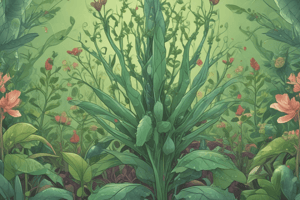Podcast
Questions and Answers
What is determinative growth in plants?
What is determinative growth in plants?
- Growth that is reversible and temporary.
- Growth that occurs only in response to environmental changes.
- Continuous growth throughout the plant's life.
- Growth that occurs in one season and ends with death. (correct)
Which plant hormone is primarily involved in delaying abscission?
Which plant hormone is primarily involved in delaying abscission?
- Auxins (correct)
- Gibberellins
- Abscisic Acid
- Cytokinins
What type of movements do plants exhibit in response to variations in growth rates?
What type of movements do plants exhibit in response to variations in growth rates?
- Growth movements (correct)
- Turgor movements
- Nastic movements
- Taxic movements
What is the effect of short-day conditions on short-day plants?
What is the effect of short-day conditions on short-day plants?
Which of the following hormones is involved in the breakdown of cell components leading to senescence?
Which of the following hormones is involved in the breakdown of cell components leading to senescence?
Which pigments are responsible for controlling photoperiodism in plants?
Which pigments are responsible for controlling photoperiodism in plants?
What is the consequence of lower night temperatures on plant growth?
What is the consequence of lower night temperatures on plant growth?
What does dormancy in plants refer to?
What does dormancy in plants refer to?
What distinguishes indeterminate growth in plants from determinate growth?
What distinguishes indeterminate growth in plants from determinate growth?
Which statement best describes the role of cytokinins in plant development?
Which statement best describes the role of cytokinins in plant development?
How do nutrient deficiencies typically affect plant growth?
How do nutrient deficiencies typically affect plant growth?
Which of the following best describes turgor movements in plants?
Which of the following best describes turgor movements in plants?
What role do phytochromes play in plant physiology?
What role do phytochromes play in plant physiology?
What is the primary function of auxins in plant growth?
What is the primary function of auxins in plant growth?
How does dormancy in plants differ from quiescence?
How does dormancy in plants differ from quiescence?
Which statement about environmental factors affecting plant growth is accurate?
Which statement about environmental factors affecting plant growth is accurate?
What is a consequence of apical dominance in plant growth?
What is a consequence of apical dominance in plant growth?
Which plant hormone is primarily responsible for promoting fruit ripening?
Which plant hormone is primarily responsible for promoting fruit ripening?
What defines the process of senescence in plants?
What defines the process of senescence in plants?
Which mechanism describes the plant's non-directional response to external stimuli?
Which mechanism describes the plant's non-directional response to external stimuli?
Which statement is true regarding photoperiodism in plants?
Which statement is true regarding photoperiodism in plants?
Which plant hormone inhibits the actions of other hormones and helps regulate water loss?
Which plant hormone inhibits the actions of other hormones and helps regulate water loss?
What is primarily the result of turgor movements in plants?
What is primarily the result of turgor movements in plants?
Which factor does NOT influence the thermoperiod for optimal plant growth?
Which factor does NOT influence the thermoperiod for optimal plant growth?
What primarily distinguishes dormancy from quiescence in plants?
What primarily distinguishes dormancy from quiescence in plants?
Flashcards
Determinate Growth
Determinate Growth
Plant growth that stops and ends in one season.
Indeterminate Growth
Indeterminate Growth
Plant growth that continues for many years.
Auxins
Auxins
Plant hormone that promotes cell enlargement, stem growth, root initiation, and delays leaf drop.
Gibberellins (GA)
Gibberellins (GA)
Signup and view all the flashcards
Photoperiodism
Photoperiodism
Signup and view all the flashcards
Short-Day Plants
Short-Day Plants
Signup and view all the flashcards
Phytochromes
Phytochromes
Signup and view all the flashcards
Dormancy
Dormancy
Signup and view all the flashcards
What is growth?
What is growth?
Signup and view all the flashcards
Differentiation
Differentiation
Signup and view all the flashcards
What are hormones?
What are hormones?
Signup and view all the flashcards
Cytokinins
Cytokinins
Signup and view all the flashcards
What is apical dominance?
What is apical dominance?
Signup and view all the flashcards
Turgor Movements
Turgor Movements
Signup and view all the flashcards
What is development?
What is development?
Signup and view all the flashcards
What are nutrients?
What are nutrients?
Signup and view all the flashcards
What are vitamins?
What are vitamins?
Signup and view all the flashcards
What is abscisic acid (ABA)?
What is abscisic acid (ABA)?
Signup and view all the flashcards
What is senescence?
What is senescence?
Signup and view all the flashcards
What are nutations?
What are nutations?
Signup and view all the flashcards
What are photochromes?
What are photochromes?
Signup and view all the flashcards
What is a thermoperiod?
What is a thermoperiod?
Signup and view all the flashcards
What is quiescence?
What is quiescence?
Signup and view all the flashcards
Study Notes
Growth and Development in Plants
- Growth: Irreversible increase in mass from cell division and enlargement.
- Determinate Growth: Plants complete their growth during a single season and then die.
- Indeterminate Growth: Plants or plant parts continue growing and remain active for years.
- Differentiation: Specialized cell forms develop for distinct functions.
- Development: Coordinated growth and differentiation into tissues and organs, influenced by genes and environment.
Nutrients, Vitamins, and Hormones
- Nutrients: Provide energy and elements for growth, obtained from air and soil.
- Vitamins: Organic molecules in small quantities that aid in catalyzed reactions.
- Hormones: Produced in growing regions, active in small amounts, involved in signal transduction pathways.
Plant Hormones
- Five Major Classes:
- Auxins: Promote cell enlargement, stem growth, root initiation, and delay leaf drop (abscission).
- Gibberellins (GAs): Increase stem growth, induce flowering, and break dormancy.
- Cytokinins: Stimulate cell division and delay leaf aging.
- Abscisic Acid (ABA): Inhibits other hormones, assists in water loss responses.
- Ethylene: Promotes fruit ripening and leaf abscission.
Hormonal Interactions
- Apical Dominance: Terminal bud inhibits lateral bud growth.
- Senescence: Breakdown of cell components leading to cell death, regulated by various hormones.
Plant Movements
- Growth Movements: Result from differing growth rates in plant parts.
- Nutations: Spiraling movements.
- Nodding Movements: Side-to-side oscillations.
- Twining Movements: Visible spiraling growth.
- Nastic Movements: Non-directional movements.
- Turgor Movements: Result from internal water pressure changes.
- Pulvini: Leaf base swellings causing movements.
- Taxic Movements: Whole plant or cells move toward or away from stimuli (e.g., light, chemicals).
Photoperiodism
- Photoperiodism: Response to day/night length.
- Short-Day Plants: Flower when days are shorter than a critical length.
- Long-Day Plants: Flower when days are longer than a critical length.
- Day-Neutral Plants: Flower regardless of day length.
Phytochromes and Cryptochromes
- Phytochromes: Pigments controlling photoperiodism, existing in two forms:
- Pr (absorbs red light)
- Pfr (absorbs far-red light)
- Cryptochromes: Blue light-sensitive pigments involved in circadian rhythms.
Temperature and Growth
- Thermoperiod: Optimum night and day temperatures for plant growth.
- Lower night temperatures can increase sugar content and root growth.
Dormancy and Quiescence
- Dormancy: Growth inactivity despite favorable conditions.
- Quiescence: Seed cannot germinate without specific environmental conditions.
- Stratification: Artificially breaking seed dormancy.
Studying That Suits You
Use AI to generate personalized quizzes and flashcards to suit your learning preferences.




